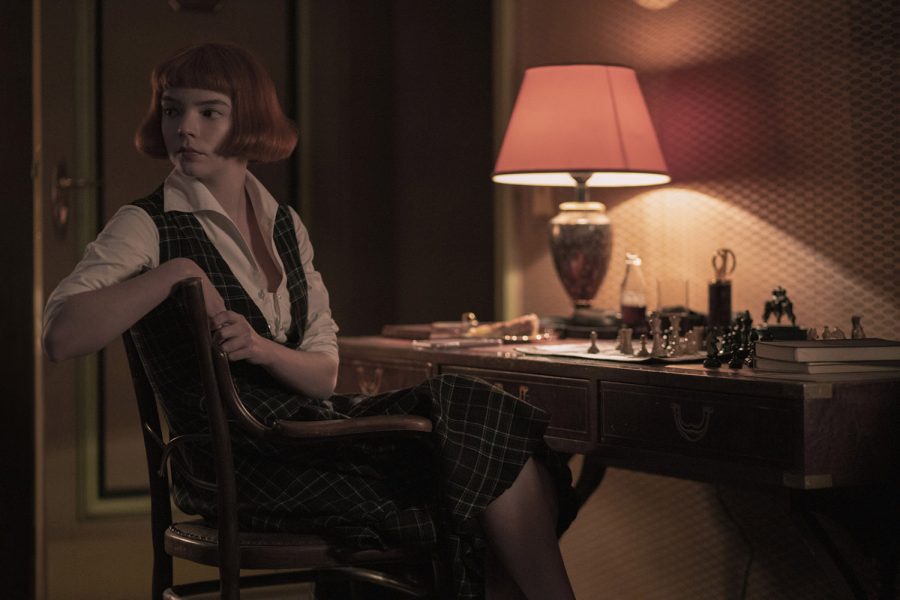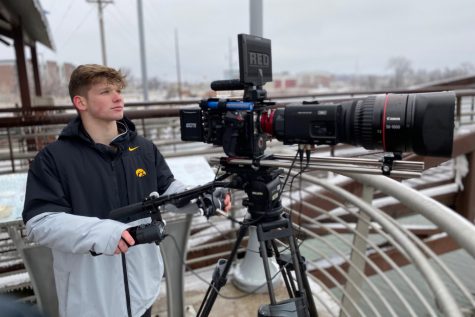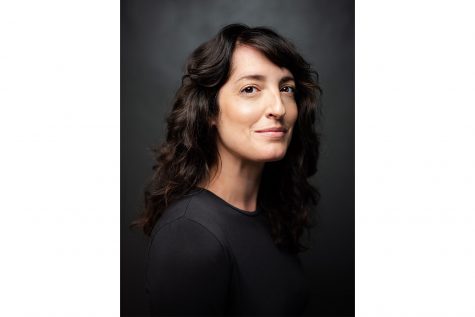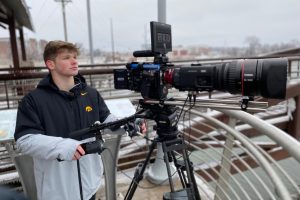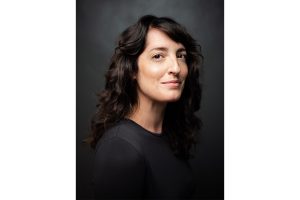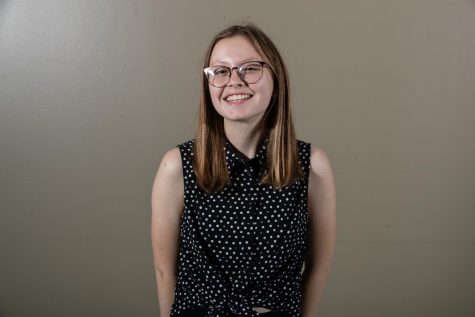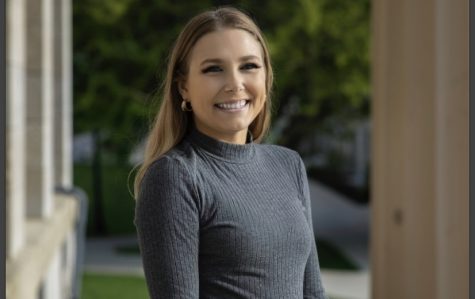The Queen’s Gambit and onward: UI Writers’ Workshop alumni share adaptation experiences
The late Walter Tevis, author of the book ‘The Queen’s Gambit’ which was adapted into a major Netflix hit, graduated from the Iowa Writers’ Workshop in 1960. Today, the DI spoke with four workshop alums who have seen their work or are having their work adapted for the big screen.
Anya Taylor-Joy stars in ‘The Queen’s Gambit’ on Netflix. (Phil Bray/Netflix)
February 2, 2021
It’s Oct. 23 and The Queen’s Gambit has just debuted on Netflix. A trailer glides across the head banner, rife with 1950s and 60s glamor while the story of Beth Harmon, an orphaned chess prodigy, is summarized across the screen. Viewers click on episode one and are immediately hooked.
The seven-episode miniseries has marked its place in streaming history as one of the most-watched Netflix programs of 2020, with well over 60 million account holders obsessing over its masterful storytelling, delightful visuals, and thrilling chess scenes. University of Iowa alums have special reason to be proud: the piece stems from a work of fiction of the same name by UI Writers’ Workshop alum Walter Tevis.
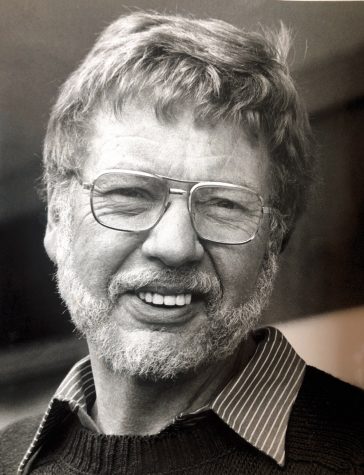
Tevis received a M.F.A. from the Workshop in 1960. The author wrote several novels that had been adapted for the screen ahead of The Queen’s Gambit, many of which enjoyed great success. Tevis’ book The Man Who Fell to Earth starred David Bowie in the film adaptation, and the author was able to use the $25,000 he made from selling the movie rights to his book, The Hustler, to finance his master’s degree at the Iowa Writers’ Workshop. He published The Queen’s Gambit a year before his early death, caused by lung cancer, in 1984. The writer was 56.
Tevis is far from the only Writers’ Workshop graduate to see his written works come to life on screen. The DI spoke to several other authors who are familiar with — or just getting their first taste — of the cinematic universe.
Iowa Writers’ Workshop professor and graduate of the workshop Ethan Canin remembers buying his daughter a chess set for Hanukkah after watching “The Queen’s Gambit,” a considerable feat given the spike in chess set purchases just ahead of the holidays.
The author has seen several of his written works adapted into films, just like Tevis, most recently The Year of Getting to Know Us in 2008, which was based off of one of Canin’s short stories and starred Jimmy Fallon and Lucy Liu. Other films based on Canin’s work include The Emperor’s Club in 2002 and Blue River in 1995.
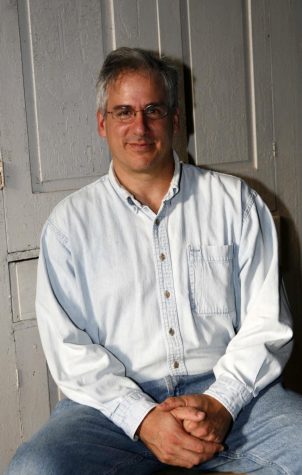
Canin described the adaptation process as everything from an adrenaline-laced thrill to a downright bore, filled with long waits and breaks between shots. While the writer has had the opportunity to write his own screenplay before — for Beautiful Ohio in 2006 — he said he once found out another one of his books had been adapted for the screen only after filming had wrapped up.
Regardless, the author said he would happily write another screenplay after having such good experiences working alongside others to bring his written work to life, although Canin doesn’t write his novels with the intention of adapting them for film.
“I’ve never written with that in mind,” he said. “If they get made into movies, I’m happy, but I’ve never changed a plot, or designed a plot for movies — it’s just too hard. It’s not my kind of thing.”
RELATED: UI students rewrite The Great Gatsby through 21st century genre: fanfiction
Writers’ Workshop Program Director Lan Samantha Chang read Tevis’ novel when it was first published, and while she has only seen photos of the show, Chang said she remembers the book and its main character being much grittier than Beth (played by Anya Taylor-Joy) in the show.
“She’s not perfectly made up all the time with mascara and that hairdo and fancy clothes,” Chang said.
Both in the novel and miniseries, Beth gets her period during her first chess competition and has to construct a makeshift pad out of toilet paper. Writing about a character getting their period never used to be done, Chang said, because writing instructors in various workshops were primarily male and were often against such occurrences having a place in the story.
“The cool thing about Tevis was that when that book was being published, he knew that that would be something he should put into the story,” she said. “I thought he was cool — I never met him, but that book was really important to me.”
Writers’ Workshop and Iowa Arts Fellow Xochitl Gonzalez is in the midst of writing the television screenplay for her novel, Olga Dies Dreaming. The novel, set to publish in January 2022, follows a brother and sister living in New York City who deal with their mother abandoning them as children. Later, they grapple with their high-powered careers in the aftermath of Hurricane Maria.
Gonzalez said she’s an anomaly because her book has yet to be adapted and is currently mid-script. If all goes well, she said, filming will start this summer. Olga Dies Dreaming was picked up by film scouts at a literary auction. The author added that she is represented by Creative Artists Agency (CAA) and that she has always been signed from book and book to film.
“So, we always knew that we were going to go — part of our strategy was to sell the film rights as well,” she said.
The author said these circumstances are fairly common if the book displays commercial appeal. Her condition for selling the rights was that she would be in charge of writing the adaptation. As a Latinx, Puerto Rican woman from a working-class background in New York City, Gonzalez said she wanted to have her voice in screenwriting because there are so few Latinx screenwriters.
“I wanted to make sure that it had a very heavy — not just Latinx — but Nuyorican perspective, because that’s a big perspective of the book and it’s a very specific, cultural thing,” Gonzalez said. “It’s like if somebody not Greek would have written My Big Fat Greek Wedding.”

UI Writers’ Workshop alum Brandon Taylor is also writing the feature film adaptation to his novel, Real Life. Actor and musician Kid Cudi has expressed interest in playing the lead role, Taylor said, and will produce the film alongside BRON Studios. Published February of last year, the semi-autobiographical book tells the story of Wallace, a gay Black man from the South who works in a Midwestern lab as a Ph.D. student. He discovers that several of his experiments are ruined, and the plot ensues.
The road to a completed screenplay is a long one, and Taylor said he is unsure when it will be completed since the film deal was cut in November. Taylor said it became clear with his producing team that he would be the one to write the screen adaptation because they wanted to sustain Taylor’s voice in the novel.
“They wanted to create an opportunity for me to try out, you know, learning a new skill in screenwriting,” Taylor said. “It’s a completely different art and thing to master. So, they’ve been really supportive and giving me lots of space and time to figure it out and try it myself.”
RELATED: Dey House ‘literary grove’ sprouts history, community
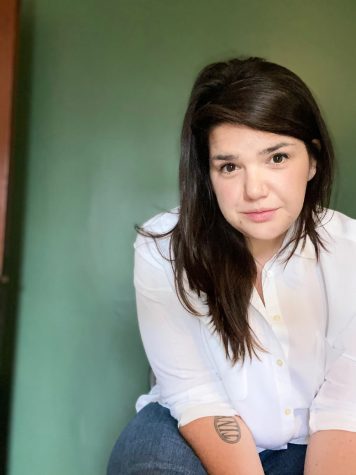
Author Claire Lombardo attended the Writers’ Workshop five years ago, where she fondly remembers being taught by professors Canin and Margot Livesey. At the Workshop, Lombardo wrote in an email to the DI, she was provided uninterrupted time to write and complete her novel The Most Fun We Ever Had. The book is currently in development to become a series on HBO, for which she is writing the screenplay.
In a previous interview with the DI, Lombardo described the screenwriting process as “new and exciting,” with many additional hands on the project, including many female producers, executives, and writers.
“The adaptation process has been an exciting one — and it was a completely unexpected turn for me; I’d never envisioned the book being turned into something cinematic, nor did I ever dream it would find such formidable advocates,” Lombardo wrote. “It has thus far been a lively learning experience — writing for the screen is an entirely different ballgame than writing a novel, and it’s been fun to broaden my horizons in that respect.”



